高考英语语法:独立主格
高中英语语法——独立主格结构和with复合结构

Two hundred people died in the accident, many of them children(=andmany of themwerechildren).
两百人死于事故,其中有许多儿童。
The boywentto the classroom,book in hand(=and a book was in his hand).那男孩手里拿着书去教室。
二.with复合结构
with复合结构也是一种独立主格结构,用法同独立主格结构。主要有以下两种情况:
1.with+名词(代词)+分词/不定式
More time given (=If more time is given),we will do it better.如果多给些时间,我们会做得更好。
Homework(having been)finished(=After homework had been finished),the boy went out to play.做完作业后,这个男孩出去玩了。
He fell asleep with the windows open.他开着窗睡觉。
He came into the room,withhisdog out.他回到了房子里,他的狗在外面。
Ha large book under hisarm.他夹着本厚书,走出了图书馆。
独立主格结构主要有以下两种情况:
1.名词(代词)+分词/不定式
(分词、不定式作状语时,其逻辑主语必须与句子的主语保持一致,如果不一致时,则分词、不定式需要带有自己的逻辑主语,构成独立主格结构。此结构在句中起原因、方式、时间、条件、伴随状语从句的作用。)
英语语法——独立主格

英语语法——独立主格独立主格结构是一个名词或代词(作为逻辑主语),加上一个形容词、副词、介词短语、分词、不定式等在句中作状语。
它有以下三个特点:(1) 独立主格结构的逻辑主语与句子的主语不同,它独立存在。
(2) 名词或代词与后面的形容词、副词、介词短语、分词、不定式等存在逻辑上的主谓关系。
(3) 独立主格结构一般用逗号与主句分开,但与主句之间不能使用任何连接词。
英语中,独立主格结构的形式是:名词或代词跟形容词、副词、介词短语、非谓语动词连在一起,构成独立主格结构。
1. 名词 / 代词 + 不定式。
如:A house to be built, we must save every cent. 由于要建一座房子,我们必须节省每一分钱。
Now here is Li Lei, Wei Fang to come tomorrow. 现在李蕾来了,魏方明天到。
2. 名词 / 代词 + -ing分词。
如:The bus coming here soon, we should get everything ready. 汽车很快就要来了,我们应该把一切事情准备好。
Mother being ill, Li Lei was very worried. 母亲病了,李蕾非常焦急。
3. 名词 / 代词 + 动词的过去分词。
如:His cup broken, he used his bowl instead. 茶杯破了,他就用碗来代替。
4. 名词 / 代词 + 形容词。
如:The ground muddy, we should be careful. 地面泞泥,我们应该小心。
5. 名词 / 代词 + 副词。
如:The class over, we all went out to play. 下课后,我们都出去玩。
6. 名词 / 代词 + 介词短语。
如:Glasses in his hand, he asked where his glasses were. 手里拿着眼镜,他问他的眼镜哪去了。
高中英语语法 独立主格结构用法全解(含答案)
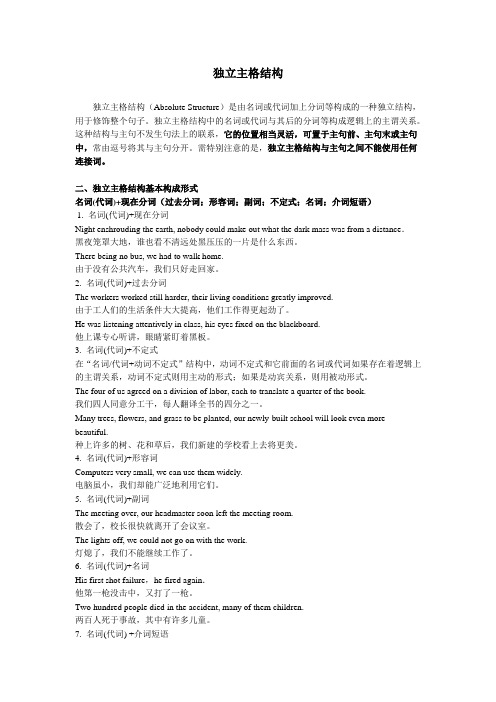
独立主格结构独立主格结构(Absolute Structure)是由名词或代词加上分词等构成的一种独立结构,用于修饰整个句子。
独立主格结构中的名词或代词与其后的分词等构成逻辑上的主谓关系。
这种结构与主句不发生句法上的联系,它的位置相当灵活,可置于主句前、主句末或主句中,常由逗号将其与主句分开。
需特别注意的是,独立主格结构与主句之间不能使用任何连接词。
二、独立主格结构基本构成形式名词(代词)+现在分词(过去分词;形容词;副词;不定式;名词;介词短语)1. 名词(代词)+现在分词Night enshrouding the earth, nobody could make out what the dark mass was from a distance.黑夜笼罩大地,谁也看不清远处黑压压的一片是什么东西。
There being no bus, we had to walk home.由于没有公共汽车,我们只好走回家。
2. 名词(代词)+过去分词The workers worked still harder, their living conditions greatly improved.由于工人们的生活条件大大提高,他们工作得更起劲了。
He was listening attentively in class, his eyes fixed on the blackboard.他上课专心听讲,眼睛紧盯着黑板。
3. 名词(代词)+不定式在“名词/代词+动词不定式”结构中,动词不定式和它前面的名词或代词如果存在着逻辑上的主谓关系,动词不定式则用主动的形式;如果是动宾关系,则用被动形式。
The four of us agreed on a division of labor, each to translate a quarter of the book.我们四人同意分工干,每人翻译全书的四分之一。
Many trees, flowers, and grass to be planted, our newly-built school will look even more beautiful.种上许多的树、花和草后,我们新建的学校看上去将更美。
语法:独立主格结构(福建高考英语必考难点之一 )
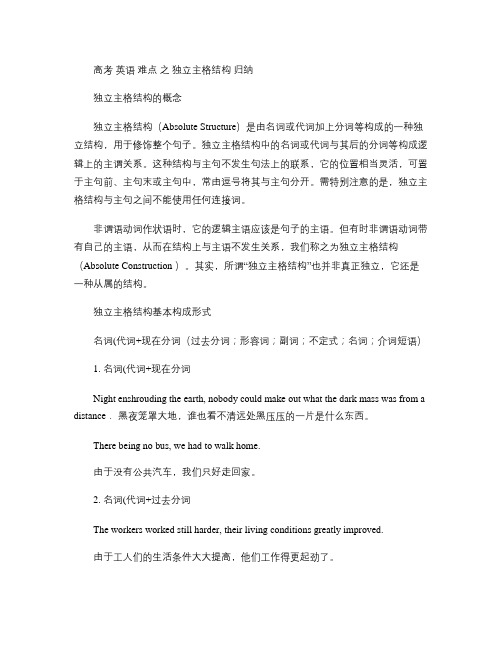
高考英语难点之独立主格结构归纳独立主格结构的概念独立主格结构(Absolute Structure)是由名词或代词加上分词等构成的一种独立结构,用于修饰整个句子。
独立主格结构中的名词或代词与其后的分词等构成逻辑上的主谓关系。
这种结构与主句不发生句法上的联系,它的位置相当灵活,可置于主句前、主句末或主句中,常由逗号将其与主句分开。
需特别注意的是,独立主格结构与主句之间不能使用任何连接词。
非谓语动词作状语时,它的逻辑主语应该是句子的主语。
但有时非谓语动词带有自己的主语,从而在结构上与主语不发生关系,我们称之为独立主格结构(Absolute Construction )。
其实,所谓“独立主格结构”也并非真正独立,它还是一种从属的结构。
独立主格结构基本构成形式名词(代词+现在分词(过去分词;形容词;副词;不定式;名词;介词短语)1. 名词(代词+现在分词Night enshrouding the earth, nobody could make out what the dark mass was from a distance.黑夜笼罩大地,谁也看不清远处黑压压的一片是什么东西。
There being no bus, we had to walk home.由于没有公共汽车,我们只好走回家。
2. 名词(代词+过去分词The workers worked still harder, their living conditions greatly improved.由于工人们的生活条件大大提高,他们工作得更起劲了。
He was listening attentively in class, his eyes fixed on the blackboard.他上课专心听讲,眼睛紧盯着黑板。
3. 名词(代词+不定式在“名词/代词+动词不定式”结构中,动词不定式和它前面的名词或代词如果存在着逻辑上的主谓关系,动词不定式则用主动的形式;如果是动宾关系,则用被动形式。
高考英语语法解读——独立主格结构
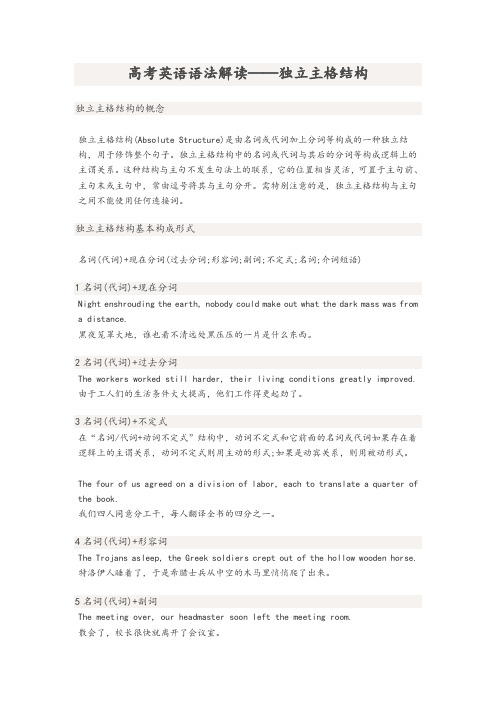
高考英语语法解读——独立主格结构独立主格结构的概念独立主格结构(Absolute Structure)是由名词或代词加上分词等构成的一种独立结构,用于修饰整个句子。
独立主格结构中的名词或代词与其后的分词等构成逻辑上的主谓关系。
这种结构与主句不发生句法上的联系,它的位置相当灵活,可置于主句前、主句末或主句中,常由逗号将其与主句分开。
需特别注意的是,独立主格结构与主句之间不能使用任何连接词。
独立主格结构基本构成形式名词(代词)+现在分词(过去分词;形容词;副词;不定式;名词;介词短语)1名词(代词)+现在分词Night enshrouding the earth, nobody could make out what the dark mass was from a distance.黑夜笼罩大地,谁也看不清远处黑压压的一片是什么东西。
2名词(代词)+过去分词The workers worked still harder, their living conditions greatly improved.由于工人们的生活条件大大提高,他们工作得更起劲了。
3名词(代词)+不定式在“名词/代词+动词不定式”结构中,动词不定式和它前面的名词或代词如果存在着逻辑上的主谓关系,动词不定式则用主动的形式;如果是动宾关系,则用被动形式。
The four of us agreed on a division of labor, each to translate a quarter of the book.我们四人同意分工干,每人翻译全书的四分之一。
4名词(代词)+形容词The Trojans asleep, the Greek soldiers crept out of the hollow wooden horse.特洛伊人睡着了,于是希腊士兵从中空的木马里悄悄爬了出来。
5名词(代词)+副词The meeting over, our headmaster soon left the meeting room.散会了,校长很快就离开了会议室。
高考英语 重难点语法讲解独立主格结构
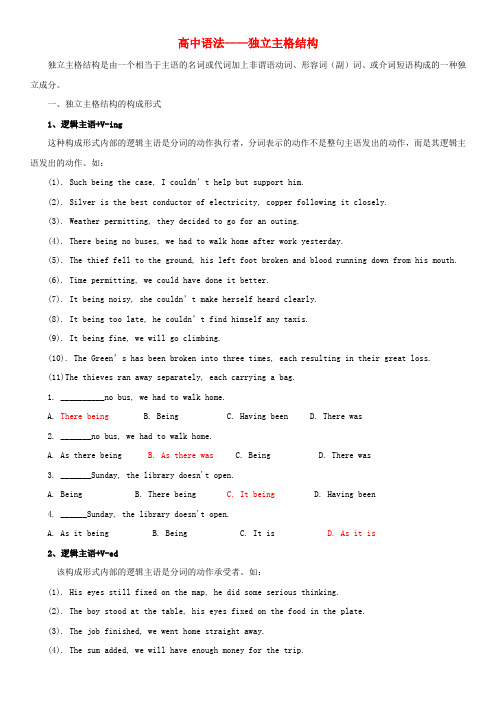
高中语法——独立主格结构独立主格结构是由一个相当于主语的名词或代词加上非谓语动词、形容词(副)词、或介词短语构成的一种独立成分。
一、独立主格结构的构成形式1、逻辑主语+V-ing这种构成形式内部的逻辑主语是分词的动作执行者,分词表示的动作不是整句主语发出的动作,而是其逻辑主语发出的动作。
如:(1). Such being the case, I couldn’t help but support him.(2). Silver is the best conductor of electricity, copper following it closely.(3). Weather permitting, they decided to go for an outing.(4). There being no buses, we had to walk home after work yesterday.(5). The thief fell to the ground, his left foot broken and blood running down from his mouth.(6). Time permitting, we could have done it better.(7). It being noisy, she couldn’t make herself heard clearly.(8). It being too late, he couldn’t find himself any taxis.(9). It being fine, we will go climbing.(10). The Green’s has been broken into th ree times, each resulting in their great loss.(11)The thieves ran away separately, each carrying a bag.1. __________no bus, we had to walk home.A. There beingB. BeingC. Having beenD. There was2. _______no bus, we had to walk home.A. As there beingB. As there wasC. BeingD. There was3. _______Sunday, the library doesn't open.A. BeingB. There beingC. It beingD. Having been4. ______Sunday, the library doesn't open.A. As it beingB. BeingC. It isD. As it is2、逻辑主语+V-ed该构成形式内部的逻辑主语是分词的动作承受者。
高考英语语法总结独立主格动词的时态

高考英语语法总结独立主格动词的时态10.1 独立主格独立主格结构的构成:名词(代词)+现在分词、过去分词;名词(代词)+形容词;名词(代词)+副词;名词(代词)+不定式;名词(代词) +介词短语构成。
独立主格结构的特点:1)独立主格结构的逻辑主语与句子的主语不同,它独立存在。
2)名词或代词与后面的分词,形容词,副词,不定式,介词等是主谓关系。
3)独立主格结构一般有逗号与主句分开。
例如:The test finished, we began our holiday. = When the test was finished, we began our holiday.考试结束了,我们开始放假。
The president assassinated, the whole country was in deep sorrow. = After the president was assassinated, the whole country was in deep sorrow.总统被谋杀了,举国上下沉浸在悲哀之中。
Weather permitting, we are going to visit you tomorrow.天气允许,我们明天去看你。
This done, we went home.工作完成后,我们才回家。
The meeting gone over, everyone tired to go home earlier.会议结束后,每个人都想早点回家。
He came into the room, his ears red with cold.他回到了房子里,耳朵冻得红通通的。
He came out of the library, a large book under his arm.他夹着本厚书,走出了图书馆10.2 with的复合结构作独立主格表示伴随情况时,既可用分词的独立结构,也可用with的复合结构:with +名词(代词)+现在分词/过去分词/形容词/副词/不定式/介词短语。
独立主格语法考点总结讲义-高三英语复习作文专题
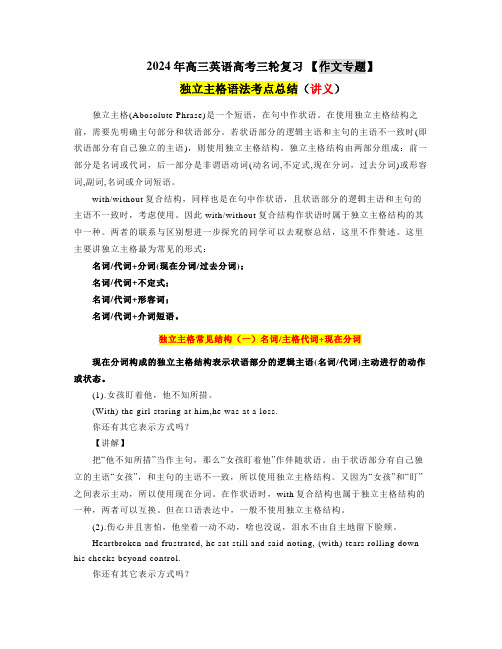
2024年高三英语高考三轮复习【作文专题】独立主格语法考点总结(讲义)独立主格(Abosolute Phrase)是一个短语,在句中作状语。
在使用独立主格结构之前,需要先明确主句部分和状语部分。
若状语部分的逻辑主语和主句的主语不一致时(即状语部分有自己独立的主语),则使用独立主格结构。
独立主格结构由两部分组成:前一部分是名词或代词,后一部分是非谓语动词(动名词,不定式,现在分词,过去分词)或形容词,副词,名词或介词短语。
with/without复合结构,同样也是在句中作状语,且状语部分的逻辑主语和主句的主语不一致时,考虑使用。
因此with/without复合结构作状语时属于独立主格结构的其中一种。
两者的联系与区别想进一步探究的同学可以去观察总结,这里不作赘述。
这里主要讲独立主格最为常见的形式:名词/代词+分词(现在分词/过去分词);名词/代词+不定式;名词/代词+形容词;名词/代词+介词短语。
独立主格常见结构(一)名词/主格代词+现在分词现在分词构成的独立主格结构表示状语部分的逻辑主语(名词/代词)主动进行的动作或状态。
(1).女孩盯着他,他不知所措。
(With) the girl staring at him,he was at a loss.你还有其它表示方式吗?【讲解】把“他不知所措”当作主句,那么“女孩盯着他”作伴随状语。
由于状语部分有自己独立的主语“女孩”,和主句的主语不一致,所以使用独立主格结构。
又因为“女孩”和“盯”之间表示主动,所以使用现在分词。
在作状语时,with复合结构也属于独立主格结构的一种,两者可以互换。
但在口语表达中,一般不使用独立主格结构。
(2).伤心并且害怕,他坐着一动不动,啥也没说,泪水不由自主地留下脸颊。
Heartbroken and frustrated, he sat still and said noting, (with) tears rolling down his cheeks beyond control.你还有其它表示方式吗?【讲解】“他坐着一动不动并且啥也没说”是主句,那么“伤心并且害怕(伴随状语1)”和“泪水不由自主地留下脸颊(伴随状语2)”是两个状语。
- 1、下载文档前请自行甄别文档内容的完整性,平台不提供额外的编辑、内容补充、找答案等附加服务。
- 2、"仅部分预览"的文档,不可在线预览部分如存在完整性等问题,可反馈申请退款(可完整预览的文档不适用该条件!)。
- 3、如文档侵犯您的权益,请联系客服反馈,我们会尽快为您处理(人工客服工作时间:9:00-18:30)。
高考英语语法:独立主格
一.构成: n / pron.+ 不定式/ 现在分词/过去分词/ 形容词/ 副词/ 介词短语. 其中前一部分是后一部分的逻辑主语
二.用法: 独立主格结构通常用逗号与主句隔开, 位置比较灵活, 主要用于书面语, 特别是文学体裁, 在口语中较为罕见.
独立主格结构在句中通常作状语, 表示方式, 时间, 原因, 条件等
独立主格结构都可变为with / without + O + OC的结构
1.n / pron +不定式
a. A num ber of officials f ollowed the emperor, some to hold his robe.
2. n / pron +现在分词
a. Today being Sunday, we have no school.
b. Time permitting, we’ll stay longer.
c. He lay on his back, his eyes looking straight upwar
d.
d. Spring having come, it is getting warmer and w armer.
e. The last bus having gone, we had to walked home.
3. n / pron +过去分词
a. All things considered, I think I should not have taken the jo
b.
b. His homework done, Jim decided to go and see the play.
c. Her shirt caught on a nail, she could not move.
4. n / pron +形容词
a. The manager sat quietly in the office, ( his ) eyes closed.
5. n / pron +副词
a. The meetin g over, all the workers went home.
b. The meal over, we began to work again.
c. He put on his socks hurriedly, wrong side out.
6. n / pron +介词短语
a. The teacher walked into the classroom, book in hand.
b. He ran away, gun in hand.
c. In front of the house was a tall tree, its top above the tops of the other trees.
a. All things considered, I think I should not have taken the jo
b.
b. His homework done, Jim decided to go and see the play.
c. Her shirt caught on a nail, she could not move.
4. n / pron +形容词
a. The manager sat quietly in the office, ( his ) eyes closed.
5. n / pron +副词
a. The meeting over, all the workers went home.
b. The me al over, we began to wo rk again.
c. He put on his socks hurriedly, wrong side out.
6. n / pro n +介词短语
a. The teacher walked into the classroom, book in hand.
b. He ran away, gun in hand.
c. In front of the house was a tall tree, its top above the tops of the other trees。
